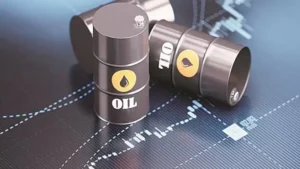Wednesday witnessed a notable increase in oil futures, influenced by anticipations around U.S. monetary policy.
He emphasized the necessity for more conclusive evidence before proceeding with rate adjustments.
April delivery of WTI crude on the New York Mercantile Exchange rose 1.25% to $79.13, with May Brent on the Intercontinental Exchange up 1.12% to $82.96 per barrel.

Powell clarified the Fed’s position, indicating it doesn’t mandate a precise return to a 2% inflation target before moderating its policy stance.
Rather, the Fed is looking for tangible signs of inflation trending sustainably toward the target.
His remarks came during a congressional hearing in the U.S. House of Representatives.
The U.S. Department of Energy’s report revealed an anticipated increase in crude oil stocks, bolstering the oil market’s momentum.
Additionally, there was a notable reduction in gasoline and distillate inventories, surpassing expectations.
Saudi Arabia’s Price Adjustment Signals Strong Demand
Saudi Arabia’s decision to raise the price of its Arab Light crude oil for Asian clientele underscores a positive shift in demand.
Aramco, the state oil giant, set April’s selling price above the Oman/Dubai average, marking an increase from the previous month, thereby signaling Saudi optimism about market demand.
Aramco also adjusted other reference prices for April upwards.
Fitch Ratings addressed Chinese demand, projecting a deceleration in gasoline demand growth due to declining domestic car sales.
The overall slow pace of industrial activity and a downturn in the real estate sector are expected to suppress diesel demand.
Conversely, kerosene demand might see an uptick driven by an increase in international flights and long-distance travel, despite its minor role in the spectrum of refined products.

